#the only hypothesis that is left is that it is psychosomatic
Explore tagged Tumblr posts
Text
Day 5; Peony
This time I took the prompt ‘shame’.
The comment had stung. Some condescending senator had turned the corner just as she kissed Daniel goodbye, took one look at her hand, saw the wedding ring and taken the liberty to presume that she should rather like to be at home tending to the little ones than here, or perhaps making them, with a wink that was more slimy the longer she thought about it.
Normally she could shrug it off with an eye roll and the thought of a snarky comment to Daniel or Rose or Ana later, but for some reason the jab actually hit its mark this time, though she did not allow him the satisfaction of showing it.
For some reason. She knew the reason. She was still nursing the tender feeling she got when she had to shake her head no as she came out from the bathroom after putting her sanitary belt on, and seeing the disappointment flit across his face. She knew he was disappointed, and he didn’t hide it when she asked, but her heart went out to him when it was in vain. Again.
An irrational part of her said that she was disappointing Daniel, just like she had disappointed everyone else. She hadn’t minded for herself at first, but his easy manner with his nieces and nephews made the image of a little girl with his curls and his ears, being read a story in his lap something she wanted to see more and more. If she had to have children with anyone, she would choose Daniel, every time.
But that was the thing, wasn’t it? If she had to have children.
She was so used to elbowing her way through a male world, she didn’t have a map for this uniquely female environment. It was rather an unexplored wilderness, this feminine domain; whether she had left it unexplored as a matter of disinterest or a fear of what she might undermine with her discoveries was a moot point; she stood here now, without a single idea how she might orient herself. Is it okay, is she allowed this feminine weakness?
The landscape was not entirely populated by the fairer sex; apart from the weight of expectation, there were doctors who would proclaim that the reason it wasn’t happening was psychosomatic, an unconscious rebellion bourne from resentment of the natural place of a woman. She was particularly susceptible to such unconscious desires, as indicated by the presence of a career. A lot of rot, if you asked her. Is it okay, is she giving into them by letting herself feel those things?
She finds herself yearning in her dreams, and if even after all the wanting and wanting and waiting and shame she is still responsible, she cannot parse it. Is it okay to be so insecure about something this important?
The idea they were young and they had time could only guide her so far. It was comforting, but didn’t stop the shame. This was all plainly silly, she reminded herself, of course one is allowed to have doubts, her head knew that. Her heart though?
The malicious irrational part of her, the one she usually paid no mind, told her that Daniel could blame her for it all, for being scared, or unwilling, or holding something back.
Could she ever doubt that Daniel might resent her for it? No, the rest of her screamed; there was no reason to believe anything of the sort. If for nothing else in this uncertain wasteland, she could be certain that she could plant herself in Daniel’s love and it would hold her fast.
Perhaps they should give it a rest for a little bit. Maybe that was an okay thing to do.
She needed to talk to Daniel.
The idea that fertility was connected with emotion was an actual hypothesis, though I wasn't able to determine how much it was taken seriously. There's a really interesting article on JSTOR (here). This was also the era that spawned 'Maternal Deprivation Theory' ie Women shouldn't work bc otherwise the child doesn't attach properly and Will Be Damaged *eye rolls*. What I’m trying to say is the 50s are hella sexist and Peggy is just trying to work out how to hold the societal expectations and her own feelings at the same time.
3 notes
·
View notes
Text
more of the conversation rewrite. context: phineas has just asked leah what possible reason johan miller (the hope colonist whose death phineas has been investigating) would have for committing suicide
“Do you remember anything he said after he woke up?” asks Leah.
“We’ve performed well over a hundred dehibernations since his,” says Phineas. “You can’t expect me to remember every conversation.”
Leah laughs without humor. “You’re right,” she says, and she starts to pace back and forth across the small room. “Why would I expect you to remember he had five dead kids and a dozen dead grandkids? It’s not like you cared about anything I had to say after you woke me up. Why would he be any different?”
Phineas has a vague memory of Miller, minutes after dehibernation, mentioning something about the family he left behind on Earth. The specifics hadn’t seemed important at the time. But now, Phineas — not a father, not a family man, and not accustomed to stepping outside himself — pauses to consider what the loss would feel like. A thought experiment. Leah, he supposes, is the closest analogue. If he woke one morning to learn that she was dead—
Multiply that by five, all at once, and Leah’s hypothesis becomes a sickeningly plausible alternative to murder. “You aren’t still annoyed at me for launching you into space, are you?” Phineas asks, retreating to safer conversational ground. “That’s months in the past.”
Leah whips around to face him, her expression thunderous, and Phineas instantly realizes that he miscalculated. “It’s never in the past for me! I’ve spent eight months making excuses for it, but you know what? I’m done. I’m done pretending it’s okay for you to treat us like machines you can take out of the box and switch on! I could handle it when it was just me, but they deserve better. We’re people, Phineas! Why the hell can’t you act like it?”
The room’s temperature seems to drop by twenty degrees. Entirely psychosomatic, Phineas is sure, but knowing it’s inside his head doesn’t make it feel any less real. “Has Clarke been feeding you this nonsense? Of course you aren’t a machine to me. You’re my friend.”
“Really? Was I your friend when you told me my family was dead, made it my job to save every person on the Hope, and dumped me on an alien planet full of things that wanted to kill me, all in five fucking minutes? That was the most scared I’ve ever been in my life. I still wake up in the middle of the night, shaking and— and trying not to scream, thinking I’m back in Emerald Vale. But you didn’t give a shit about what it would do to me. You didn’t give a shit about anything but putting me to work.”
Phineas’s first thought is that he never said anything about Leah’s family— but he did, didn’t he? Seventy years. Nearly a full human lifespan. He didn’t just tell her how long she was in stasis; he told her that everyone she knew — everyone who wasn’t a child when she left Earth — was long dead. He didn’t consider that implication, just as he didn’t consider what it would feel like to be inside that escape pod, hurtling towards an unknown destination at a thousand kilometers per hour with only the barest understanding of what was going on. “That was thoughtless of me,” Phineas admits, through the sudden, cold tightness constricting his throat. “I was too hasty to send you to Terra 2, and I’m sorry for that. I’m sorry for all of it.” He swallows sharply, and he continues, voice wavering against his will, “You are my friend, even if I failed to act like it. I never intended to harm you.”
Leah’s glare softens into something more disappointed than angry, and she touches her fingers to her forehead, eyes closed, in an infinitely tired gesture. “I know you didn’t mean to. If I thought you wanted to traumatize me back then, I would’ve left you in Tartarus. But that just makes it worse. What you did to me was cruel. What you did to Song in there — making it her job to save Halcyon, right after she found out her mom was dead — that was cruel, too. I know how to deal with someone who wants to hurt other people. I have no fucking clue how to deal with someone who just doesn’t care enough not to.”
“I do care! I wouldn’t be doing any of this if I didn’t care.“
“Then why do I have to stop you from sticking a brain probe in every colonist we revive?”
Phineas stops short. “How is that relevant?”
“Are you fucking kidding me? You gave me brain damage two separate times, wrote it off as some meaningless little accident, and still wanted to do the same thing to the next person!”
“I needed to examine your neural activity. I wasn’t trying to—“
“That doesn’t matter! People aren’t toys, Phineas. You can’t just do whatever you want to them and go ‘oops, I didn’t mean it’ when something breaks. You have to stop doing that, or—” She steels herself with a breath. “Or this isn’t gonna work anymore.”
12 notes
·
View notes
Text
What happened to Sherlock? Part VII – The Importance of Being Earnest (1)
This is the seventh instalment of my meta series, where I’ll take a closer look at the two last episodes of the show this far. As you know if you’ve read the earlier parts, a premise for this analysis is that we’re seeing the entire show from Sherlock’s perspective; we’re literally inside the great detective’s head since Day 1, and he’s working inside his Mind Theatre where he reconstructs scenarios with different ‘actors’ representing different concepts and problems he needs to delve into, very much following his usual MO of crime solving. By now I also part from the assumption that from at least HLV and onwards Sherlock is trapped inside his own mind (EMP theory), possibly in some kind of comatose state, and in ‘real life’ the detective is hospitalized and close to dying. These conclusions are based on the different hypotheses I’ve already tested in the earlier installments of this meta series, which you can find below:
Introduction - The game is on (explains the method of analysis) Part I - Blog vs TV-show Part II - Re-living memories Part III - Drugs and weirdness Part IV – Heartbreak and coma (1) Part IV – Heartbreak and coma (2) Part V – Bizarre scenarios Part VI - Live and let die (1) Part VI - Live and let die (2)
The hypothesis to test this time is about Sherlock’s inner development:
Hypothesis #7. By TFP Sherlock has managed to figure out some essential things about John and the importance of staying alive, and he has managed to get in touch with his own repressed emotions.
I think this show – especially from HLV and onwards - might represent an important inner journey for Sherlock, where he tries to find out what went wrong between him and John and what could be done to fix it. On his introspective journey, he gets to learn a lot about John, but also about himself and how he comes across in John’s eyes. To test this train of thought, I’ll re-visit TLD, TFP, and some scenes from TST, to see what this might mean in terms of Sherlock’s Mind Theatre Simulations. But first of all, I’d like to present a background idea:
The Therapist
Judging by the total number of scenes with therapists this far, they seem to play an important role in BBC Sherlock. But which role exactly? And are the therapists we see even real? After TLD I think it’s justifiable to question this. At the end of TST we see Sherlock visiting John’s therapist Ella Thompson:

According to John’s blog - which I believe we can use as a sort of anchor to the show’s ’reality’ (see my Hypothesis #1) – John has indeed been in contact with someone named Ella Thompson, who I think we can safely assume is his therapist, judging by the circumstances in which John mentions her. Her name appears in one of the very first blogposts:

And then Ella herself comments on another post:
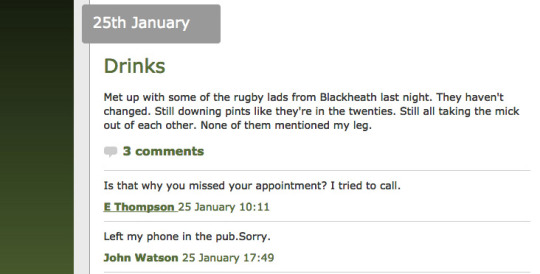
And then she is mentioned again when John has just met Sherlock:

She also begs him to “please answer your phone”, after the post called “My New Flatmate”, where we can find John’s first account of the events related to ASiP. As for the TV-show, Ella appears in person in the beginning of it, in ASiP:

In the taxi heading for Brixton in ASiP, Sherlock tells John that he deduced John must have had a therapist: (all quotes below are based on the incredibly useful transcripts by Ariane DeVere - my bolding):
JOHN: You said I had a therapist.
SHERLOCK: You’ve got a psychosomatic limp – of course you’ve got a therapist.
Mycroft’s attitude towards Ella’s competence is a bit arrogant. Apparently she didn’t realize that war trauma isn’t the real cause of John’s trembling left hand:
MYCROFT: You have an intermittent tremor in your left hand.

She thinks you’re haunted by memories of your military service.

JOHN: Who the hell are you?
Yes; how could Mycroft know this? Therapists are usually bound by strict confidentiality, and civil servants asking questions about clients’ health issues are no exception. Did he threaten Ella? Or steal the document? Sherlock’s brother isn’t even mentioned on John’s blog until ASiB, and in the show John never mentions Mycroft’s theories to Sherlock. If Mycroft represents Sherlock’s brain here (as some of us believe), and the kidnapping scene only occurs inside his head, then this is rather Sherlock’s personal conclusion.
MYCROFT: She’s got it the wrong way round. You’re under stress right now and your hand is perfectly steady. You’re not haunted by the war, Doctor Watson ... you miss it.
After this, nothing more is said about Ella for a long while. Until she seems to start communicating via John’s blog again after Sherlock’s ‘death’, when John publishes a blogpost titled “A New Beginning”:

I don’t think it’s farfetched to assume that Ella has tried to persuade John to keep up the blogging. Later, in the comment section of the blogpost “Death by Twitter”, Ella also interacts with the username “theimprobableone”. The impression I get is that Ella is kind, reaching out to someone who isn’t her client (even if this would actually just happen to be Moriarty :))) She might also be very competent, but the therapy won’t work unless the client actually collaborates.
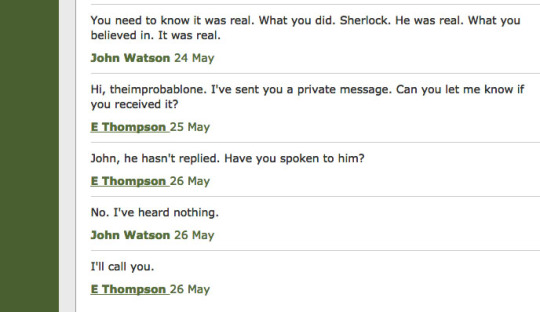
But in the TV-show we see a new therapy session in TRF, apparently 18 months after their last one, where John seems unable to tell Ella what actually happened to Sherlock, and why this has affected him so deeply.

Perhaps this scene is most of all Sherlock’s conclusion after observing on the blog that John was now back to Square 1 in his therapy with Ella? Which means he was back to ‘blogging-will-help’.
I’m gonna part from the assumption (according to my hypotheses #1 and #2) that the first two and a half series of this show represent Sherlock re-visiting his memories while reading John’s blog. He might be influenced by drugs while doing this, and he might ‘pimp up’ these memories by fantasizing about events he deduces must have happened, but where he wasn’t personally present. So he tries to mentally reconstruct what might have been said in these scenes. Since Sherlock isn’t present in the scenes with Ella described above, I think they might be fine examples of such ‘deductive fantasies’, basically constructed from reading John’s blog. (Regularly this is also an important part of Sherlock’s methods for crime solving by deductive reasoning inside his Mind Palace).
But in S4, at the end of TST, we see Sherlock himself visit Ella, although in a setting that reminds me more of a cathedral than a visits room for a therapist. The whole scene seems extremely ‘staged’, like a theatre piece.

And when Ella tells Sherlock he has to open up completely for her to be able to help him, we learn two things:
Sherlock states that this is really not his style. In other words: he’s not ready for it, and
Sherlock thinks his main problem concerns John rather than himself. He believes what he really needs is to find out “what to do about John”.
Which might mean, in my opinion, that Sherlock now believes that ‘Ella’ won’t be able to actually help either of them. Conclusion, in Sherlock’s view: John needs a new, different therapist. And who has shown to actually be effective in curing John’s ailments - his earlier psychosomatic limp and trembling hands? Sherlock has. So, to continue testing this meta series’ earlier hypothesis (#5) about Sherlock running mind scenarios, and at the same time begin to test hypothesis #7, I’ll make the following prediction:
Prediction #1: If Hypothesis #7 is true, TLD could serve as an ‘appointment’ where Sherlock is John’s therapist trying to figure out ‘what to do about John’.
One interesting thing with TLD is that it both starts and ends with John visiting his new therapist. But in the end it turns out that this ‘therapist’ is actually Eurus, a ruthless killer who has disguised herself as a therapist (while the real therapist appears to be ‘closeted’ in a horrendous way). But I don’t think Eurus is ‘real’; she’s rather an aspect of Sherlock himself.
Sherlock might also assume that if he can’t protect John and John’s loved ones, he has failed John (hence his extreme sense of guilt and self-loathing after TST). But if Eurus isn’t even ‘real’, in which ways has Sherlock really failed to protect John? I think the real issues are:
He can’t protect John from being 'outed’ in media, who will speculate about his sexual orientation (the problem of TRF), which John has shown signs of fearing. Being associated with famous ‘weirdo’ Sherlock Holmes is ‘bad for John’ because he’ll drag John into media exposure.
By TLD, Sherlock has reached a mental stage where he cannot help John keep up his heteronormative façade any longer; thus ‘Mary’ will have to go, to disappear, which Sherlock believes will destroy John.
Below follows a series of possible ‘what-if’ scenarios, which Sherlock might be running inside his mind in TLD (and this is of course mostly my speculation). They are following the same pattern I used to test Hypothesis #5: 1. Detect possible initial questions, 2. Investigate possible elements of inspiration from movies and/or Sherlock’s own memories and 3. Explain possible results in the show from each of Sherlock’s mind experiments. Plus discussions about evidence that indicate this is indeed a MP scenario. But this time the scenarios are also ‘therapeutic’; this is where Sherlock tries to look closer at John and their relationship, taking over from Ella the job as John’s therapist.
TLD, Scenario 1: What will happen when John visits a new therapist?
Inspiration: We don’t know if Sherlock has experiences in this field, but since he’s addicted to drugs it’s not unlikely that he has some knowledge of therapy from rehab. In this scenario I think Sherlock takes the role of therapist himself.
In Part 6 of his Follow-the-dogs meta @sagestreet makes a good case for Ella being a Sherlock mirror (My bolding). ‘Thompson’ refers to a character mentioned on Sherlock’s website. (Does anyone know, by the way, what happened to that website? It has been down for months by now!):
“And need I tell you that ThompSON could be a nice mirror for WatSON? (Let’s not even go into the whole fact that this could be Ella Thompson’s husband, which would make Ella a Sherlock!mirror of the first order. I mean, Ella has been a slightly distorted Sherlock!mirror right from the start, what with telling John, in TRF, he should articulate his feelings for Sherlock after Sherlock jumped…

...just to give you one example.)”
[running, running the TLD simulation, staged with ‘actors’ that either represent John or Sherlock or the challenges they are up against…]
Result: John appears to be in deep mourning; he tells the therapist that he has sleeping problems and ‘can’t always cope’. He also gives away something about his alcohol problems and loneliness; he has no one to confide in. He expresses his guilt and bitterness for not taking care of his child. But he won’t tell his therapist about how he keeps seeing his departed spouse as a ghost: MARY (offscreen): Are you gonna tell her about me? JOHN (shaking his head): No. MARY (offscreen): Why not? JOHN: ’Cause I can’t. MARY (offscreen): Why not? JOHN: Because I can’t ... you know I can’t. She thinks you’re dead.

And neither will John confess anything about his feelings regarding either Sherlock or his (now departed) wife. By the way, don’t you feel the scene with the new therapist in TLD is a tiny bit familiar? I at least see certain similarities with this situation from TRF:
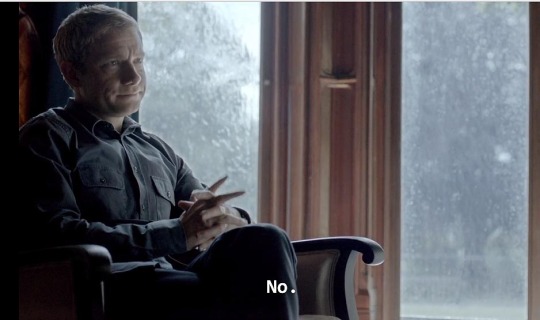
This was John mourning Sherlock, and now we see exactly the same thing regarding ‘Mary’? Still in TLD, John is unable to put into words any sort of feelings towards the people closest to him.
Then they start to talk about Sherlock, whom the therapist’s behaviour reminds John of (could the show be any more obvious than this? :-o). But John claims that he’s not thinking of Sherlock at all, and that their separation is Sherlock’s own fault for locking himself away in his flat; Sherlock hasn’t even attempted to make contact (hiatus after TRF, anyone?). Then the session is interrupted when a sports car stops with squealing tyres outside the house.
Discussion: This is supposedly about ‘Mary’s death and John’s neglect of his daughter Rosie, plus Sherlock’s despicable conduct. But I think what we actually see here is Sherlock’s deeper exploration of how John must have felt when he believed Sherlock was dead after ‘the fall’ in TRF. Sherlock needs other ‘characters’ in his Mind Theatre, because he’s still unable to face the fact that it was he, Sherlock, who caused John this level of grief by leaving him. And neither can he fathom the reason for this deep grief. Which might indeed be difficult for Sherlock to comprehend, because why then would John marry someone else when Sherlock got back? John doesn’t open himself up here. But I do think Sherlock subconsciously learns that John might have felt guilty after Sherlock’s ‘suicide’, maybe for having called him a ‘machine’ or other negative things, maybe for drawing media’s attention to Sherlock in the first place, unable to protect him against the slander. Maybe for failing to take care of his friend. All since Sherlock’s comment in TSoT about having been a ‘child’ for John and Mary to look after, I imagine John’s supposed guilt regarding Rosie could just as well be about Sherlock (”everything is about Sherlock”).
TLD, Scenario 2: What will happen if Sherlock tries to make John confess his feelings for Sherlock?
Inspiration: This seems to be almost entirely based on Sherlock’s own memories. I think he is drawing from his vast experience of criminals and drugs. In ASiP there’s a serial killer who convinces his victims to commit suicide with a drug. But we’re also presented a serial adulterer in the same episode; the murder victim Jennifer Wilson. In TSoT we have the Mayfly Man, a serial ‘dater’ who is also a killer, and whose behaviour is reminiscent of John’s. This is, I believe, a long, charged and complex scenario stretching out along the whole episode of TLD. And it’s largely based on metaphors, hence the word play where ‘serial killer’ is substituted with the harmless ‘cereal killer’. As many have said by now: If murder is a metaphor for falling in love, confessing to it is a confession of love. And I believe we have a lot to go on in this show…

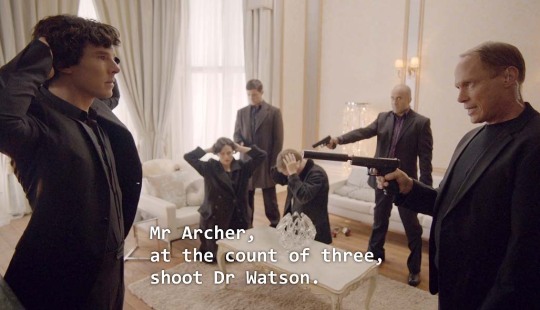
[running, running a scenario, where Culverton Smith represents an aspect of John, but where John also represents himself]
Result: A ‘serial killer’ (Smith, representing John) wants to confess to his ‘crimes’, but at the same time he is very contradictory about it, because he doesn’t want to take the consequences of confessing. So TD12 - a memory-altering drug (the effect of which is similar to alcohol) - is the solution; Smith/John can back-pedal and pretend the confession was never made.


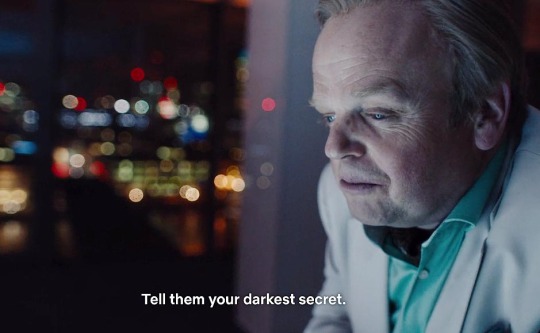
Sherlock doesn’t have evidence, but tries to make the ‘serial killer’ confess openly by playing along with him and then confront him. But it doesn’t work; John just beats Sherlock down and leaves him - again. But later Sherlock manages to collect evidence by tricking the ‘serial killer’ to act when Sherlock is at his most vulnerable, which provokes John to save him. In this episode, we’re lead to believe that Culverton eventually, after Sherlock’s ‘entrapment’, confessed to being a serial killer and was taken into custody. But the thing is, we never see Culverton actually confess to any specific crime – not even to the police. What he says to Sherlock’s face is merely that “killing human beings” makes him “incredibly happy” and that he “likes to make people into things”. But this wouldn’t hold in court for a murder case, would it? Who, in particular, did he actually kill? What exactly is Culverton accused of?

Sadly, there’s no open love confession from John – or John’s mirror - resulting from this scenario. But at least Sherlock manages to take on a new approach; he delivers two physical hugs to MP!John – one to ‘John the cereal killer’, and one to a guilt-ridden, repentant John at the end. The apparent topic of discussion is always something else than Sherlock’s and John’s feelings for each other, but at least we’re told that the ‘serial killer’ now can’t stop confessing ‘off-screen’. In the end of the scenario, though, Sherlock insists on wearing the deerstalker, which he has always disliked.
Discussion: I think maybe the most important result of this experiment is that Sherlock will never get a love confession out of John by sacrificing his life, no matter what ‘Mary’ (= heteronormativity) tells him to do. Actually, I believe the modeling shows that it’s Sherlock who needs to take the first step and actually tell John how he truly feels about him. The hug at the end of the scenario - at Sherlock’s initiative - makes this evident.

But I think this scenario does hint that Sherlock is finally heading in the right direction, even if he’s definitely not ‘there’ yet (the latter is indicated by the fact that he puts on the deer stalker, thus succumbing to keep hiding who he really is). The internal conflict in both Sherlock’s and John’s minds becomes blatantly obvious in this scenario; homophobia and heteronormativity are basically the most powerful obstacles that stand in the way for their relationship to develop.
I think Sherlock is dealing with a heavy onslaught of emotions; partly because reaching a point of honesty about his and John’s relationship is still a bit of a long-term goal, and partly because the journey there is booby-trapped with difficult topics like jealousy and guilt. We hear a lot about the atrocious ‘serial killer’ in this episode (Sherlock still doesn’t approve of ‘love’?), but we never get to see any of his supposed victims or any kind of incriminating evidence for Culverton’s supposed crimes. Except for his attempt on Sherlock’s life, which Sherlock admits is actually a kind of entrapment, set up by Sherlock himself.
TLD, Scenario 3: What’s the role of faith in Sherlock’s and John’s relationship?
Inspiration: There are many re-cycled elements in this scenario, which speaks for it being based mainly upon Sherlock’s memories. I made a list of the repetitions in a meta some time ago (scroll down to TLD). Walking the streets of London with Faith, for example, is a bit like running these streets with John in ASiP. Faith’s cane and limping is even directly compared to John’s in ASiP.
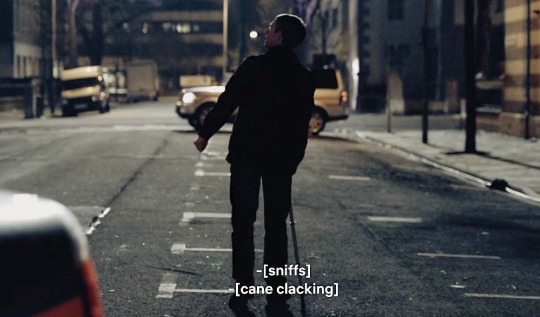
And her gun is thrown in the Thames, just like John’s was in the Pilot.
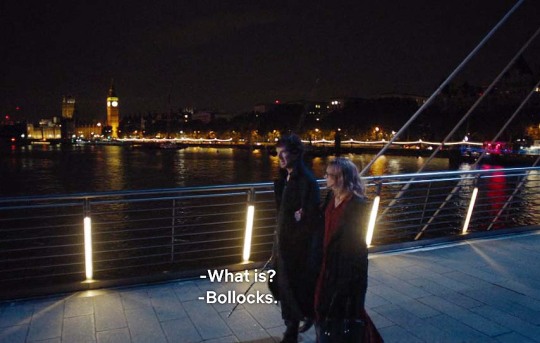
Look how Sherlock has taken over John’s Faith’s cane, and is supporting her.
[running a scenario, where I believe Culverton Smith’s daughter Faith represents what could have existed between Sherlock and John]
Result: Faith – here impersonated by (supposedly) Culverton Smith’s adult daughter - is strong and fragile at the same time. She manages to resist her drug-induced amnesia (‘wilful ignorance’?) of what Culverton is up to by writing a note, and she puts Sherlock on her case. But Sherlock also discovers that Faith is suicidal (directly compared to John in ASiP), so he tries to help her by keeping her company and throws away her weapon. But we see the same gun firing here, as in the beginning and end of this episode:

However, while contemplating his own possible suicide, Sherlock gets stuck in his childhood memories.
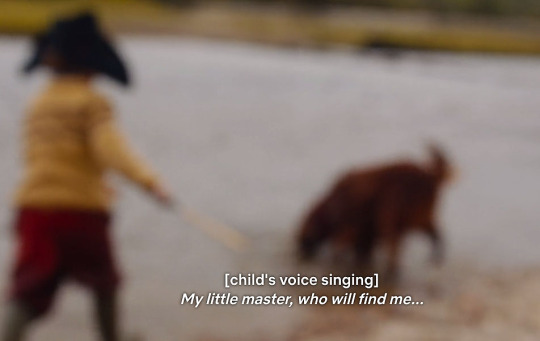
And mixed up with this, we’re exposed to subliminal flashes of a syringe and a spoon, possibly with dissolved heroine:

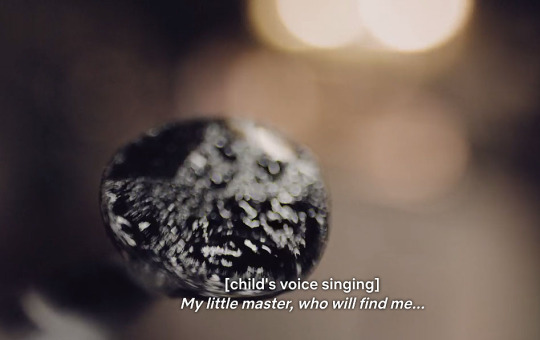
Discussion: As far as I can see, that’s Sherlock’s kitchen in the background. I wonder: did someone in Sherlock’s past kill themselves? Did one of his parents? Did this make him turn to drugs? It’s particularly interesting that the moment Sherlock approaches his childhood memory is exactly when Faith disappears; he ‘loses faith’. This might say something about how traumatic his memory is. But if this version of Faith is Eurus, and Eurus is a part of Sherlock himself, then this also means that he finds her again in TFP, doesn’t it?
A likely (in my opinion) significance of this losing Faith scenario has been presented by @sagestreet in a very interesting addition to one of my earlier metas (X); “Sherlock (in his own mind) is telling himself here that what he thought helped John as they met (curing his limp, becoming his friend, giving him laughter, warmth and friendship) never, in fact, existed!”
I also think it’s noteworthy that Sherlock now has ‘Faith’ for a client, the same way he had ‘Love’ (=Lady Smallwood) for a client in HLV (and ‘Hope’ as an opponent in ASiP, for that matter). Unfortunately, the result is only slightly better than with Love; this time Sherlock at least believes he has solved the case, but the real Faith turned out to not have actually been acquainted with Sherlock.
TLD, Scenario 4: What will John do if Sherlock ruins himself with drugs?
Inspiration: This scenario also seems based on Sherlock’s memories from his life with John; the list of repetitions can be used here as well. Like Sherlock waving a gun and shooting the wall (TGG), trying to convince John that he can predict the future (ASiP), John punching Sherlock in the face (ASiB, TEH), etc.
[Running, running a scenario where Sherlock is isolating himself and destroying his own brain and body with drugs inside 221B]
Result: Well, this rather dystopic scenario – paradoxically – might in a sense be pretty close to Sherlock’s own reality, because this is what I believe he actually did in John’s absence (directly after the wedding). Here we meet a Sherlock who has turned 221B into a meth lab, who is hallucinating gravely and who frightens Mrs Hudson with his dangerous tantrums.

(On a meta level, I think Sherlock’s Shakespeare quotations might be a ‘call to arms’ directed at the audience; how much more heteronormative crap are the viewers going to endure before the bulk of us start to protest loudly?)
But after Sherlock at least manages to save his cup of tea (quite the obvious metaphor here), Mrs Hudson finally takes charge. Sherlock is then ‘delivered’ to John in a fast sports car and a pair of kinky hand-cuffs (insider joke: the car is an Aston Martin). And the premises is now once again John’s new therapist’s house; in a way, the session continues.

But we also meet a John who is even more disapproving of Sherlock than in TAB, but this time he seems to care very little about Sherlock’s drug use or health in general. John says nothing about Sherlock visiting a children’s hospital while being high, and he doesn’t care when Molly claims that Sherlock is dying from the drugs. John actually encourages Sherlock to take more drugs:

Discussion: To me this plot line isn’t even remotely realistic; ‘real’ John would simply not treat his friend this way. He mourned him for two years, why would John not care about Sherlock dying now? But if this is rather Sherlock beating himself up in his Mind Palace, his bias and self-loathing could totally produce this result. And apparently this tactic, no matter how elaborate, is useless; Sherlock ruining himself on drugs will never lead to any change in their relationship – John will not even acknowledge his ‘cry for help’. Sherlock has been dishonest to John so many times that John no longer trusts him when he tries to be honest, and his drug addiction doesn’t exactly help this. Conclusion: It’s Sherlock who must take the first step; he must prove to John openly that he does indeed love him, because John has never understood subtleties. I’m not sure that Sherlock understands this result just yet, though ;).
TLD, Scenario 5: How is John’s therapy going?
Inspiration: Again, Sherlock is perhaps drawing from his own experience and memories, and tries to continue psychoanalysing John.
[Running a scenario where John’s emotional state in most of TLD is contrasted to how he feels after the Hug]
Result: After the intimate hug scene, where John cries on Sherlock’s shoulder (without hugging him back, mind you!) we’re supposed to get a ‘happy ending’ feeling, right? And yes; at first we learn that John seems “so much better”, and his new therapist (=Euros = Sherlock) expresses her pleasure with this.

But, scratching a bit on the surface, this overly optimistic image falls apart quite quickly. They may have solved some issues, but the main ones are still unanswered. Sherlock is “back to normal” again, or at least he’s taking cases. And yes, he’s clean-shaven and tidy, he no longer appears high but rather his usual irritable self, and his flat no longer looks like a meth lab (’straightened up’ by Brother Brain and his spooks, wasn’t it?). Lady Smallwood (=Love) flirts with Mycroft (=Brother Brain). But it seems that Sherlock himself is still working alone; John isn’t there with him. And one of his clients says the other is channelling Satan. And then, there’s suddenly a gun in the therapist’s hand. in this episode, it’s John’s turn to get shot.
Discussion: John appears to feel better, judging by his final therapy session of the episode. But look at the ‘pool of blood’ under his feet (Eurus even mentions ‘blood on the carpet’ at this point). This rug is similar to the one Janine was lying on at CAM Tower, right before Sherlock was shot in HLV, isn’t it?

And the gun looks like John’s gun. In fact, the smoking gun (with tranquilizers??) at the end of TLD...
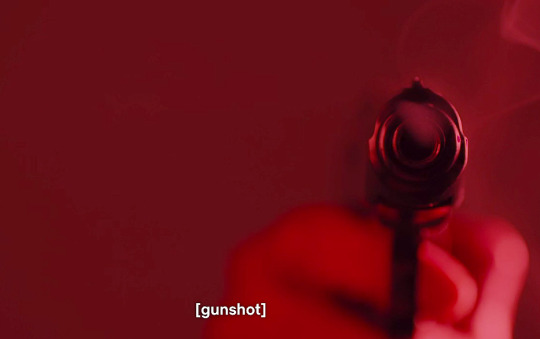
...is the same as in the beginning.

And the hand holding it seems like John’s hand.

John may write with his left hand, but he definitely shoots with his right. (Which by the way puts Eddie van Coon from TBB in another light. Hmm...)

The therapy session has come full circle, I believe. If Sherlock could kill himself with drugs, John could definitely do it with a gun. Let’s not forget that we have two suicidal protagonists in this show, which I read as a Romeo-and-Juliet kind of drama, interpreted by our favourite Drama Queen (hence the Shakespeare quotes in TLD and elsewhere :) ). John was suicidal already when he met Sherlock in ASiP, but Sherlock saved him merely by existing. And I think the key point here is what John says on his blog: #Sherlocklives means #Johnwatsonlives. But if Sherlock dies, so will John, most probably. So Sherlock has to stay alive to save John Watson from committing suicide, that’s the most important task that he has. And, as I’ve tried to show in earlier installments, he’s actually dying in S4. But he has to stay alive for John’s sake.
In conclusion, I think this is where Sherlock - in all honesty - has to admit that his ‘therapy sessions’ towards John don’t actually work; he’s definitely not a 'real’, competent therapist (which becomes glaringly obvious when Eurus/Elsa shoots John). Curing a limp and a tremor may be a good and useful thing, but it doesn’t actually deal with the kind of far deeper problems John and Sherlock have - both of them. Makes me wanna scream to him: “Give up, Sherlock! You’re not supposed to be John’s therapist; this is about you, not John!”
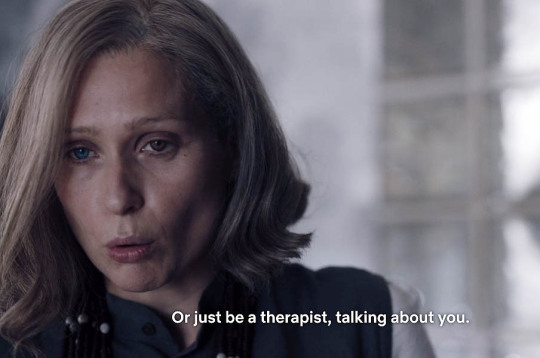

In my view, this is Sherlock expressing his frustration; he gets bored by his own fruitless scenario, and ends it all by shooting down his main ‘actor’. The session is over and we’re back to Square 1. Sherlock must now pass to the next level, go deeper still, facing his own demons. He’ll have to travel back in time, approaching his most traumatic memories. He must face Sister Sentiment...
But since this post is getting veeery long, I’m gonna have to save Sherlock’s experiments with Sister Sentiment for Part 2 of this installment. :)
(For more discussion about the therapists in BBC Sherlock, see @gosherlocked‘s meta on this topic, with additions.
(One of the best analyses of this episode that I’ve read so far was written by @loudest-subtext-in-tv immediately after TLD aired in 2017 (X).)
Tagging some people who might be interested: @raggedyblue @ebaeschnbliah @sarahthecoat @gosherlocked @loveismyrevolution @sagestreet @tjlcisthenewsexy @elldotsee @88thparallel @devoursjohnlock @sherlock-overflow-error
42 notes
·
View notes
Text
This is for you
For the lovely @balloonarcade
(This will not make any sense unless you have read her fic Hypothesis To summarize it briefly that Shockwave after being shadowplayed did some horrific experiments on his Conjunx Endura in search of his emotions that birthed the twins. This is a postulation about what would have happened, if Shockwave succeeded in regaining his emotions, but losing his memories like TFP)
These Autobots have been welcoming, more than they ought to. He should be out there, making connections, networking like a good Senate dog, but he's here, hiding in a dusty room. He wasn't unwatched, Red Alert had stringently insisted it as a part of his 'parole'. Orion— Optimus Prime did not look at him as he agreed. Prowl has been refusing to be in the same room as him, he doesn't know what he did to him, which numbers on a file was the scene of his personal carnage, but he can extrapolate. He doesn't blame him. He doesn't want to be around himself either.
He just wants some time to think, he's not isolating himself, no matter what Rung said, if he had to listen to him call Shockwave a victim of the Senate one more time he would— do nothing. He would meekly be back in his office for the next session on the dot. This was a part of his penance, if it made people feel safer, who was he to deny them?
He clenched and relaxed his hands over and over. Ratchet said the loss of sensation would fade in time, psychosomatic. Shockwave knew the truth. It wouldn't, because these were not his hands, this was not his frame. He wasn't himself.
The door opened behind him, another person come to gawk at the walking husk, but he does not hear the sound of footsteps, and he knows who it is with the clarity of hindsight.
He swiveled his head, tried not to move the rest of his frame. It's like watching a rare bird land on your knee, careful, careful, now, don't startle him. There he was, Sunstreaker, skirting the edges of whatever room Shockwave was in like always. He hasn't been able to talk to him. He's managed to make Sideswipe laugh, but not Sunstreaker. Whatever he did to him was worse, at least Sideswipe had a place he was put when he was finished with him, but Sunstreaker, him, he kept where he could have unlimited access.
Every time he's tried to talk to him, he was able to last one sentence of Shockwave's fumbling, before he vacated the room, Sideswipe trailed in his wake, distressed. He's always watched him, the way he trained in the pits, he must be prepared by now, to do what the others cannot. Shockwave wants to shout he would never, that's not him, it never could be— but that's not true at all, is it? He would never say a word against his vigil, he was glad someone knows the appropriate way to deal with this situation.
He missed his Conjunx, the torn edge of a bond, the only lifeline left to him. They knew this silent figure, they would have been able to reach him where Shockwave could not.
Sunstreaker moved with predatory grace. Was he going to—? Shockwave didn't deserve a final request, but he would ask for it anyways. He wanted to leave a note, a plea, don't punish Sunstreaker, it was for the best.
(fully deserved)
Shockwave tensed, and relaxed his hands one more time, before letting them fall to rest limply at his sides. He told his body not to tremble, this was a relief, and it was. Palliative care for when your patient was unsalvageable. He had to stand still, and let it happen, couldn't be simpler.
He turned off the feed to his optic. He did not want to watch.
He waited, and waited, but there was no knife to his spinal strut, no blow to the head (of course there wasn't that's what the Senate—) He couldn't take the anticipation anymore and shuttered it back open.
Sunstreaker stood before a pair of parallel bars. How had he not noticed them, was he dissociating again?
He was rapt, his body turned to face him. He should go back to pretending to harmlessly observing the wall—
But
But
Sunstreaker was blank faced as he positioned himself, textbook perfect, in the starting position for Aeriform, 1st Mvt. Celerio. Shockwave couldn't get enough air as he started. Sharp, swift, he looked like he was floating over the bars as he spun fast enough to dislocate a joint, if he wasn't careful. He alighted on the bar for only a second, before he bounded off to weave himself through the bars.
It was very impressive, Celerio was not something a beginner could do.
It was almost an exact recreation of his own Conjunx dances, he could see the ghost of them layered over top. The pivot of the foot, the arch of the ankle as he turned to clasp his hands behind him, one foot outstretched to bow his head in a gesture of sorrow.
There should be two here, twins. Sunstreaker danced like there still was, he would curl forward to allow an invisible partner to pass, stood off center when he should take center stage. The gap was like a optic gouged out.
This was their favorite dance, Caelus's masterwork, it told the story of love lost, and reborn. It was one of their favorites, to give to him, they thought it romantic.
Sunstreaker was devoid of life as he did it, perfunctory, and void of any recognizable emotion. He must be mocking Shockwave. Did Sideswipe know how to do this too? When did his Conjunx have the time to teach them, in those torture chambers? Shockwave would have never—Oh, he realized distantly, oh. Shockwave had taught him something other than vivisection after all. He had misunderstood, he had gravely misunderstood. He couldn't feel his limbs anymore. His entire body was muffled, it was spreading from his hands. He had to tell Ratchet, but he couldn't move. He couldn't move!
Sunstreaker danced like a marionette, a pretty, pretty doll for Shockwave to play house with. Wind him up, watch him go, this is for you. Don't you feel special?
Don't you feel L o v e d ?
Love was their favorite endearment for Shockwave.
He—He— locked his Conjunx in a cell, and then did this ?
It was a perverse distortion of the happiest moments of Shockwave's life. That monster, that vile, craven, pestilential, monster! He polluted the memories that not even going under the Senate's knife had touched. He had fought to keep them, he had been loved, and had loved, he didn't want to forget. He would have offered every speck of happiness, every feeling of adoration, if he knew it would lead to this.
There was no bit of deductive reasoning, no thought Logical enough to justify this.
Sunstreaker slowed, arms swung for the Tacetia 3rd Mvt., Shockwave had missed the second, he should have watched. This performance, he knew, was to please him.
He found his legs, as he stumbled blindly to the door. He was never prone to cowardice, but like regret it's something he has learned. He was out, out and away. It didn't matter where, as long as it was not here. He needed to find Ratchet or Rung. Those words were the rhythm to which he staggered forward.
He would bump into one of them eventually, or fall into a pit of scraplets, either would do.
24 notes
·
View notes